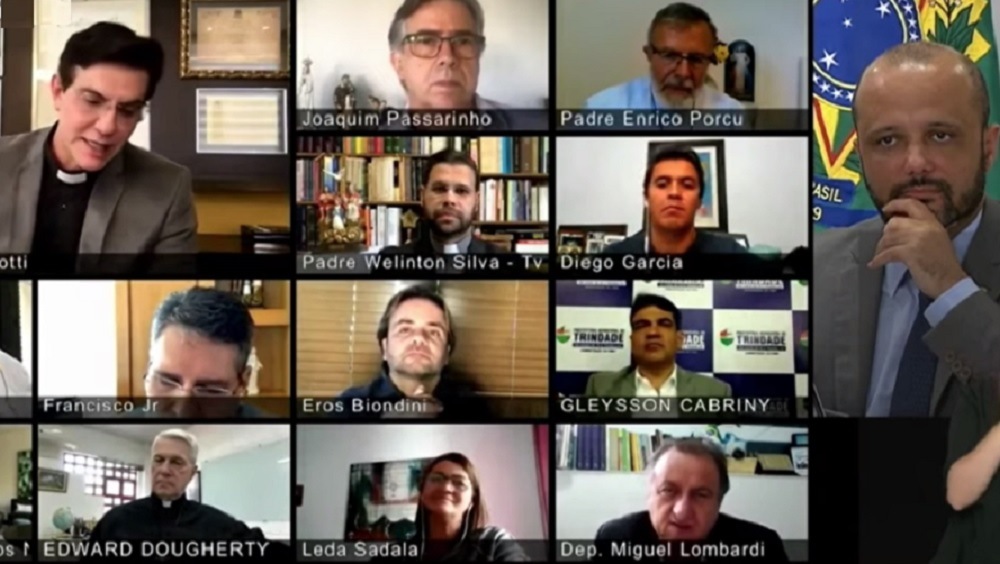RIO DE JANEIRO, BRAZIL – President Jair Bolsonaro’s drop in popularity has attracted proposals from alliances in exchange for public funds. One of the most tempting came from conservative priests and laity who control much of the Catholic radio and TV broadcasting networks.
Linked to the politically divergent wing of the National Conference of Brazilian Bishops (CNBB) within the Church, they pledged “positive media” for government actions in the novel coronavirus pandemic. In return, however, they requested state and grant funding, through advertising, to expand their communication network.
The proposal came on May 21st, in a videoconference with the participation of Bolsonaro, priests, deputies, and representatives of some of the largest Catholic communication groups. The meeting was public and broadcast by the Planalto’s social media and TV Brasil.

In the “virtual pilgrimage”, the group requested access to the Ministry of Science, Technology, Innovation and Communications, the National Agency of Telecommunications (ANATEL), and, mainly, the Secretariat of Social Communication of the Presidency (SECOM).
Owner of the executive branch’s fifth-largest budget, SECOM has R$127.3 (US$25,663) million tied in contracts with advertising agencies. Bolsonaro has promised to personally handle the matter. One of the most explicit requests was made by Father Welinton Silva, of Pai Eterno TV, linked to the Divino Pai Eterno Basilica Sanctuary in Trindade.
Silva said the station, which has been on the air for a year, is experiencing difficulties and is hoping for a rapprochement with SECOM to provide a “positive agenda of government actions” in the Covid-19 pandemic.
“Our reality is very difficult and challenging because we work with small donations, with low marketing. We really need greater support from the government so that we can continue to communicate the good news, bringing to the knowledge of the Catholic population, the vast majority of this country, the good the government has done and is doing for our people,” said the priest. “We need to ensure that these microphones aren’t turned off, that these cameras aren’t shut off.”
Priest and singer Reginaldo Manzotti, of the ‘Evangelizar é Preciso’ Association, with his own radio and TV network, demanded agility and extension of contracts and stressed the efforts available to Catholics to halt the current wear and tear in Bolsonaro and the government’s image.
“We are a force, we want to be in homes and help to build this Brazil. And, more than ever, we know the weight of negative media. And we want to be together,” observed Manzotti, addressing the President.
Entrepreneur João Monteiro de Barros Neto, from Rede Vida, said that “Bolsonaro is a great hope.” He also argued that Catholic media outlets need to be “truly prestigious”. Barros Neto asked not only for more interviews but also for the President’s attendance at events promoted by Catholics. “Rede Vida is the fourth largest digital TV network in the country, but in order for us to grow, we need to have more investments,” he summarized.
Jealousy
TV stations linked to religious groups received R$4.6 million in payments from SECOM last year for institutional and public utility commercials. Catholic outlets received R$2.1 million and Protestants received R$2.2 million. In 2020, Catholic TV stations have so far received R$160,000, while Evangelicals received R$179,000, according to SECOM reports.
The virtual meeting was mediated by the government leader in the Chamber, Major Vitor Hugo, with the Catholic Parliamentary Front. The deputy attended prayer groups of the Catholic Charismatic Renewal. Jealous of the Evangelical Parliamentary Front’s access to the Planalto, the president of the Catholic caucus, Deputy Francisco Jr., asked Bolsonaro to promote a monthly breakfast of talks and prayer with them.

“We’re a little jealous. We are the majority and the majority always wins an election,” said Francisco Jr., for whom the caucus agenda “has the face of Jair Bolsonaro”. Deputy Diego Garcia said, for his part, that the bench wants to strengthen the government. “You can count 100 percent on relevant matters in support of the government,” Garcia told Bolsonaro.
Federal Deputy Eros Biondini (Pros-MG) said there are “Catholic entrepreneurs aligned with the government” interested in investing in Brazil and advocated the release of funds for philanthropic organizations in the sector that maintain health units.
Audience
The Catholic Radio Network has eight generators that distribute content to over a thousand broadcasters and transmit in a chain to about 430. The TV system is also significant. In Brazil, there are nine Catholic TV stations that generate content: Aparecida, Nazaré, Imaculada, Horizonte, Pai Eterno, Rede Vida, Canção Nova, Sigulo 21 and Evangelizar – the last three linked to movements of the Catholic Charismatic Renewal. The former did not take part in the videoconference.
Rede Vida, the largest of them, has in its grid program icons of the movement, such as the ‘O Terço Bizantino’ by Father Marcelo Rossi and the ‘Rede Vida Sertaneja’ by Father Periquito.
In the videoconference with Bolsonaro, Father João Henrique, of the Aliança de Misericórdia, described the President as someone who faces a “spiritual battle” that demands “spiritual weapons”. “We identify greatly with the battles you are fighting, we are many in the Catholic Church who pray for you. We miss you. The Catholic Church wants to embrace its son and would like to have him closer and more active within the Church,” he insisted.
The flirtation between Bolsonaro and Catholic media outlets sympathetic to the government represents an onslaught from the Planalto on the latent division in the Church. On the one hand, there are conservatives aligned with the government, mainly those linked to the Catholic Charismatic Renewa; on the other hand, there are progressives and critics of Bolsonaro linked to the CNBB. Some recent events have marked an escalation in tensions.
The President’s constant presence in anti-democratic demonstrations and his position against the health recommendations in the fight against the Covid-19 pandemic, caused the CNBB to raise its tone against the government and say that Bolsonaro “threatens health” and has lost social “credibility”. Organizations linked to the episcopate have even advocated the impeachment of the president.
Priests identified with conservative and charismatic lay movements (non-ordained practicing Catholics), on the other hand, have approached the Planalto.
“Broadcaster has never been recognized,” says entrepreneur
Entrepreneur João Monteiro de Barros Neto, from Rede Vida, said he had no more contacts with the government after the videoconference on May 21st. Barros Neto also said that there was an approximately 85 percent drop in state advertising in the Bolsonaro government and that, even in previous governments, the station “never came to be recognized for its coverage, scope, and diversity of programming”.

“Rede Vida expects that, in relation to the government and its companies, government advertising can be in line with its scope and relevance,” said the entrepreneur.
Neither the churches nor the Planalto wished to comment; the CNBB claimed not to have participated in the meeting.

